

What is Creative Writing?

Written by Scott Wilson
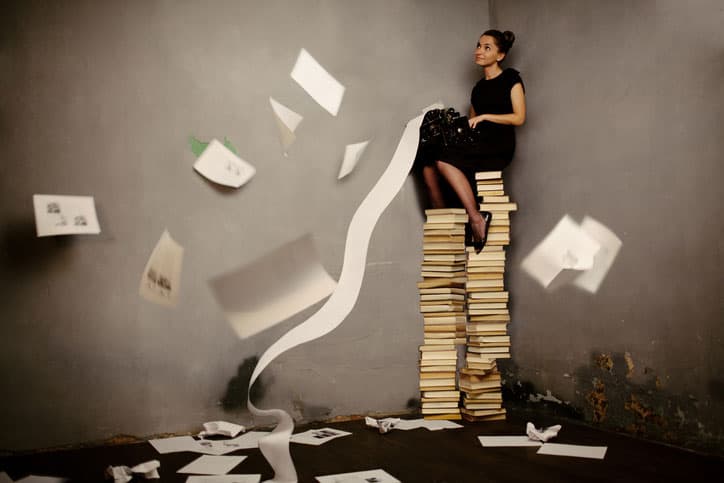
Creative writing is any kind of writing that employs creative literary or poetic techniques in the service of either fiction or non-fiction writing. It involves original composition and expressiveness of the individual author.
Ask ten creative writing professors what creative writing is, and you’ll get eleven different answers. Turn to the dictionary and the definition invokes invention and incorporation of imagination. But what are the limits of imagination? Where does invention begin?
Every sentence in every work ever written began as an act of creation in the mind of the writer.
Creative writing may be most easily defined by what it is not…
- Technical writing
- Professional or business writing
- Scholarly or academic writing
Creative writing is the entire body of the writer’s craft that falls outside the boundaries of the ordinary.
Yet you will find many entries in the canon of those fields that might also be considered creative writing. No one would consign Truman Capote’s groundbreaking In Cold Blood to the sterile cells of mere journalism. But that haunting novel is unquestionably also an important work of investigative reporting.
So, what is creative writing, if a non-fiction novel of a horrific quadruple murder falls into the same scope as a classic of American literature like To Kill a Mockingbird ?
It has to do with style and art. Creative writing goes to the heart of the individual expressiveness of the writer. It breaks the boundaries of the typical. That’s an exercise of artistic skill that can happen in any topic, toward almost any goal. And it’s the heart of what it is to be a writer, no matter what you write about.
Defining creative writing isn’t easy. Rooms full of the best authorities routinely disagree. But what is creative writing , isn’t the most interesting question to ask here. Instead, we would be best served by asking another:
Why Is Creative Writing Important?

Storytellers were plying their craft thousands of years before the written word was invented. The creative spark doesn’t belong to words. It may not even depend on language. It draws instead on a deep part of what it is to be human. Invention, imagination, the urge to create… these are all deep and vital parts of the human experience.
Creative writing is important because it is evocative.
That well of creativity flows forth in many arts and forms of expression. But in creative writing it has found a medium where it can be both preserved and shared. It’s a method of human connection that has no expiration date, no geographical or even cultural limit.
Writers touch the souls of their contemporaries first. But like Shakespeare, Wordsworth, and Lady Murasaki, their reach may also span generations.
Creative Writing Fuels Communication in All Forms of Writing
Although fiction is the first refuge of creative writing, that expressiveness serves the purposes of just about any kind of author.
The goals of most other forms of writing are focused on various kinds of literal communication. A journalist seeks to convey the facts and the context of important news stories. Technical writers need to communicate the details of operating programs and machinery, clearly describing all kinds of minute details with zero ambiguity. Business communications are created with a view toward clarity and concision—helping readers get the main points of the piece quickly and without confusion.
Creative writing can also help to serve these purposes.
Creative writing taps into a different level of communication. While it may, and often does, aspire to other goals like offering clarity and detail, it also goes toward developing emotional connection. The reader will take away more than mere words from a piece of creative writing.
Creative Writing is Important For Making Other Kinds of Writing Compelling
Just as importantly, creative writing entertains. In a story about the importance of algorithmic and high-frequency trading, all kinds of technical details must be absorbed to make sense of the issues. Both technological and economic concepts have to be introduced. In a comprehensive article about the subject, readers from outside the field could be expected to nod off about two pages in.
But put the story in the hands of Michael Lewis, and you get Flash Boys , a New York Times Best Seller.
It’s not important that Flash Boys did well because it was entertaining, however. It’s important because the market trends and activities it described have real impacts on many of the readers. Retirement funds, college savings, family investments… all are affected by the story Flash Boys tells. Today, millions of readers who would never otherwise have understood how their investments were being handled can make an informed assessment… thanks to creative writing.
How To Separate Creative Writing From Less Creative Forms of Writing

In general, it’s safe to say that a piece of writing is creative when it makes use of literary devices such as:
- Narrative development
- Imagination and invention
In Cold Blood passes this test due to Capote’s use of characterization, plot development, and world-building. It’s considered today to be a pioneering example of the non-fiction novel, a paragon of the creative writing world.
The original crime reports, local newspaper articles, and subsequent court documents detail the same events with the same participants. Yet they are not works of creative writing. The incident is described in dry, straightforward, technical language. The timeline is linear and offered without consideration of pace or drama.
Both Capote and the authors of those other articles and documents set out to inform. But Capote’s goal was also to captivate.
New Journalism Tells the Story of How Creative Writing Has an Important Role in Non-Fiction
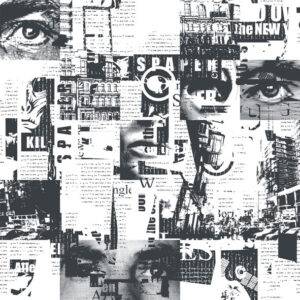
Books like Wolfe’s The Right Stuff mixed truth and dramatization, documentation and invention, to tell larger stories about serious events. In dramatizing those stories, New Journalism writers also drew more readers and achieved broader awareness of the stories.
At the same time, long-form New Journalism pieces, deeply researched and documented, were able to report stories in depth in a way that traditional journalism often did not. By invoking plot, characterization, and narrative structures, the New Journalists could keep readers involved in long and complex issues ranging from crime to politics to culture.
New Journalism is important in defining what is creative writing because it is clearly an example of both creative and journalistic writing. It demonstrates the ways that creative writing can serve other forms of writing and other kinds of writers.
Of course, it’s also possible to come at the divide from the other shore. Categories of writing that are clearly creative in nature include:
- Novels and novellas
- Flash fiction and short stories
- Plays and film scripts
These works incorporate elements of storytelling that may not always be present in other forms of writing. A newspaper article will often have a setting, action, and characters; creative writing will offer plot, pacing, and drama in describing the same story.
What is Creative Writing Coursework Like in College Degree Programs?

All university students are exposed to basic coursework in English language and communication skills. These all go to the elementary aspects of writing—the ability to construct a sentence, a paragraph, a paper. They teach grammatical rules and other elements that make a work readable to any reader of the English language.
Even the general education requirements in college programs touch on creative writing, however. Students may be assigned to write essays that explore creative styles and imagination. They’ll be assigned to read novels and stories that are time-tested examples of the finest kinds of creative writing. And they’ll be asked to explore their impressions and feelings, and to exercise their imaginations and analyze the intent of the author.
Creative writing programs go beyond the basics to touch the imagination of the writer.
Creative writing exists just on the other side of those general English and literature courses. Students in creative writing classes will be asked to take the extra step of creating their own stories using the techniques they have learned.
In fact, they may be encouraged to break the same rules that were so laboriously learned in their regular English writing classes. Creative writing works to allow writers to tap into their own imagination and emotion to forge a deeper connection with readers.
Student Workshops Offer an Interactive Way of Learning What Creative Writing Is All About
Creative writing degrees will go much further into developing a sense of what creative writing is. they continue to include many reading assignments. but instructors also introduce concepts such as:.
Genre is the method used to categorize written works. Creative writing programs explore the tropes and expectations that exist for different genres and deconstruct them for better understanding.
Story structure and form
The structure and form of a novel and a short story are very different. Creative writing programs explore different formats and how they impact creative storytelling.
Plot is not a universal feature of creative writing, but a good plot can make or break a creative work. Classes look at the features and composition of plot, and also teach plotting.
Voice, tone, and creative expression all come out of the narration of a piece of creative writing. Creative writing courses explore both the textbook forms of narrative and show how to use it to serve plot and story.
Style and rhythm
One clear feature of creative writing in all genres is that it rests on a sense of rhythm and of styling that other types of writing ignore. Many courses found in creative writing degree programs explore the ways in which writing style serves story and hooks the reader.
In addition to formal classes, students will better learn why creative writing is important and the purposes it serves through workshops. These informal gatherings are designed to foster discussion, to present examples of different types of writing, and to critique and hone individual creative writing skills .
Through that process, creative writing degrees help students better identify what creative writing is and how to use it effectively.
Creativity is Important No Matter What Your Career Goals in Writing May Be

Creative writing training allows writers in any genre to develop more complete, more meaningful, and more memorable ways to get a point across. Using the skills and techniques learned in creative writing courses can inject humor, gravity, and other sensations into any piece of writing. And those very techniques can improve concision and clarity.
Figuring out what creative writing is and what it is not, is the first thing you should leave behind in a writing career. The dry definitions of the dictionary or droning English professors are the last place you should look.
Creative writing is the process of engaging your imagination and talent to serve the purpose of whatever piece of writing you are working on. And that’s why creative writing is important.

- Onsite training
3,000,000+ delegates
15,000+ clients
1,000+ locations
- KnowledgePass
- Log a ticket
01344203999 Available 24/7

What is Creative Writing?
Discover What Is Creative Writing as we unravel the art of self-expression through words. In this blog, learn the meaning and techniques of creative writing, igniting your imagination and honing your storytelling skills. Unlock the world of literary creativity and learn how to craft compelling narratives that captivate readers.

Exclusive 40% OFF
Training Outcomes Within Your Budget!
We ensure quality, budget-alignment, and timely delivery by our expert instructors.
Share this Resource
- Report Writing Course
- Effective Communication Skills
- Speed Writing Course
- E-mail Etiquette Training
- Interpersonal Skills Training Course

Creative Writing is a form of art that allows people to express their thoughts, ideas, and emotions through the written word. It is a mode of self-expression that combines imagination with linguistic skills to create compelling narratives, poems, and other forms of literature. A Statista survey found that 76,300 Authors, Writers and Translators work in the United Kingdom alone in 2023. This shows Creative Writing is a demanding career worldwide.To know more about it, read this blog, to learn What is Creative Writing, how to write captivating narratives, and discover the essence of expressive writing.
Table of Contents
1) Understanding What is Creative Writing
2) Key elements of Creative Writing
3) Types of Creative Writing
4) Importance of Creative Writing
5) The Creative Writing process
6) Tips for effective Content Writing
7) Conclusion
Understanding What is Creative Writing
Creative Writing is the art of crafting original content that elicits readers' emotions, thoughts, and imagination. Unlike Academic or Technical Writing, Creative Writing allows for more personal expression and imaginative exploration. It encompasses various forms such as fiction, poetry, non-fiction, and drama, all of which share the common thread of artistic storytelling.

Key elements of Creative Writing
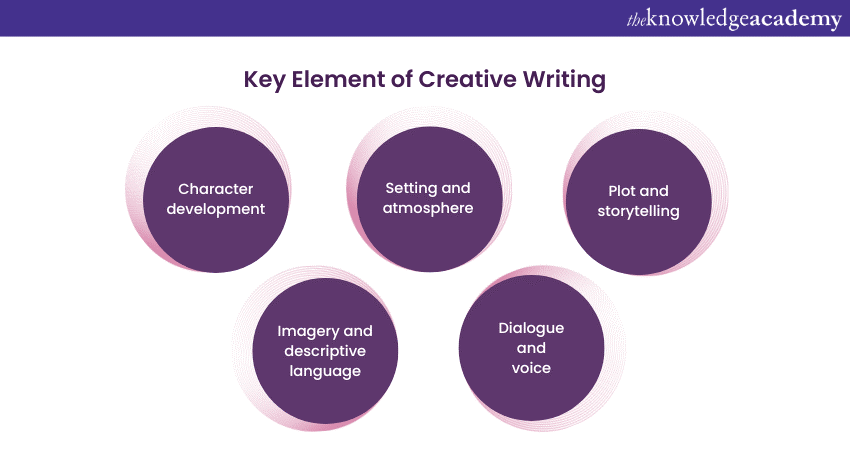
2) Character development: Compelling characters are the heart of any great story. Through careful development, characters become relatable, complex, and capable of driving the plot forward.
3) Setting and atmosphere: The setting and atmosphere create the backdrop for the story. By skilfully crafting these elements, Writers can enhance the overall mood and tone, allowing readers to feel like they're living within the story's world.
4) Plot and storytelling: A well-crafted story keeps readers engaged and invested in the narrative's progression. This includes introducing conflicts, building tension, and crafting satisfying resolutions .
5) Dialogue and voice: Dialogue adds authenticity to characters and provides insight into their personalities. A distinctive narrative voice also contributes to the story's uniqueness and captivates readers.
Types of Creative Writing
Creative Writing encompasses various genres and forms, each offering a unique platform for expressing creativity, storytelling, and emotion. As you delve into the world of Creative Writing, it's essential to explore the various types and discover which resonates with you the most. Here are some of the prominent types of Creative Writing:
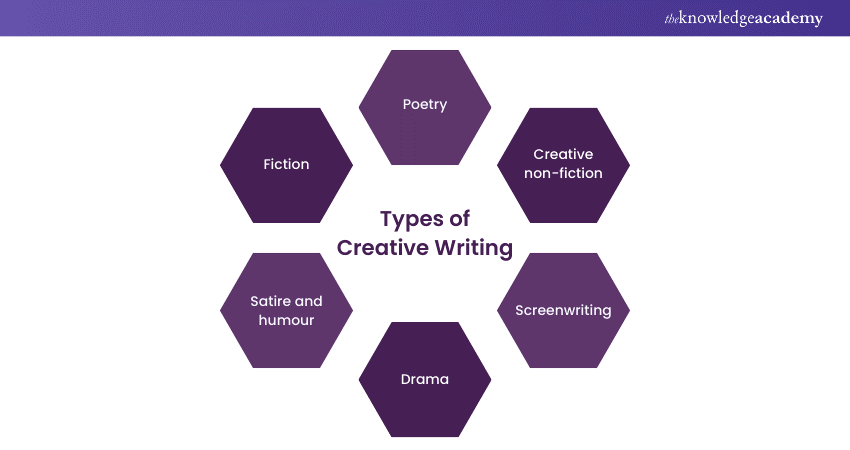
1) Fiction
Fiction is perhaps the most well-known type of Creative Writing. It involves inventing characters, settings, and plotlines from scratch. Writers have the freedom to create entire worlds and realities, whether they're set in the past, present, future, or even in alternate dimensions.
Novels, short stories, novellas, and flash fiction are all forms of fiction that engage readers through compelling characters, intriguing conflicts, and imaginative settings. From fantasy realms to gritty crime dramas, fiction transports readers to new and exciting places.
2) Poetry
Poetry is the art of condensing language to evoke emotions, provoke thoughts, and communicate complex ideas using rhythm, rhyme, and vivid imagery. Poems' conciseness requires Writers to choose their words carefully, often crafting multiple layers of meaning within a few lines.
Poetry can take various forms, including sonnets, haikus, free verse, and slam poetry. Each form carries its own rules and conventions, allowing Poets to experiment with structure and sound to create impactful compositions. Moreover, poetry delves into the depth of emotions, exploring themes ranging from love and nature to social issues and personal reflections.
3) Creative non-fiction
Non-fiction writing draws from real-life experiences, observations, and research to convey information, insights, and personal perspectives. This form includes genres such as essays, memoirs, biographies, autobiographies, and journalistic pieces.
Non-fiction Writers blend storytelling with factual accuracy, presenting their ideas in a compelling and informative manner. Personal essays offer a glimpse into the writer's thoughts and experiences. At the same time, memoirs and autobiographies share personal journeys and reflections, connecting readers with the author's life story.
4) Drama and playwriting
Playwriting is the creation of scripts for theatrical performances. The challenge lies in crafting engaging dialogue and constructing scenes that captivate both the audience and the performers.
Dramatic Writing requires an understanding of pacing, character motivations, and the visual aspects of storytelling. While Theatrical Writing requires a keen sense of the following:
a) Character dynamics: Building relationships between characters and exploring their motivations and conflicts.
b) Stage directions: Providing clear instructions for actors, directors, and stage designers to bring the play to life.
c) Dramatic structure: Crafting acts and scenes that build tension and engage the audience.
5) Satire and humour
Satire and humour utilise wit, sarcasm, and clever wordplay to critique and mock societal norms, institutions, and human behaviour. This form of Creative Writing often challenges readers to view the world from a different perspective.
Moreover, it encourages them to question established conventions. Satirical works, whether in literature, essays, or satirical news articles, aim to entertain while also prompting reflection on serious topics.
Master Copywriting skills with our Copywriting Course – join today and become an expert Copywriter!

Importance of Creative Writing
Creative Writing holds a profound significance beyond its role as a literary pursuit. It bridges imagination and reality, fostering personal growth, communication skills, and cultural preservation. Here's a closer look at why Creative Writing is of paramount importance:
1) Personal expression and catharsis
Creative Writing is a sanctuary for self-expression. Individuals can voice their innermost thoughts, emotions, and experiences through poetry, stories, and essays. This act of sharing vulnerabilities and joy brings about a cathartic release, offering a therapeutic outlet for emotional expression. Moreover, it cultivates a deeper understanding of oneself, promoting self-awareness and self-acceptance.
2) Cultivation of communication skills
The art of Creative Writing cultivates effective Communication Skills that transcend the written word. Writers learn to convey ideas, concepts, and feelings coherently and captivatingly.
This proficiency extends to verbal communication, enabling Writers to articulate their thoughts with clarity and eloquence. As a result, it enriches interpersonal relationships and professional endeavours.
3) Nurturing empathy and perspective
Writers develop a heightened sense of empathy as they craft diverse characters and explore multifaceted narratives. Immersing oneself in the shoes of different characters fosters understanding and tolerance for various viewpoints and backgrounds. Readers, in turn, experience this empathy, gaining insight into the complexities of human nature and the diverse tapestry of human experience.
4) Exploration of social issues
Writers wield the power to effect change through their words. They can shed light on societal issues, challenge norms, and provoke critical conversations. By addressing topics such as social justice, equality, and environmental concerns, Creative Writing becomes a catalyst for positive transformation and advocacy.
5) Connection and impact
Creative Writing builds bridges between individuals by establishing connections on emotional and intellectual levels. Stories resonate across cultures, transcending geographical and temporal boundaries. The impact of a well-crafted story can be enduring, leaving a mark on readers' hearts and minds.
Unlock your creative potential with our Creative Writing Training - register now!
The Creative Writing process
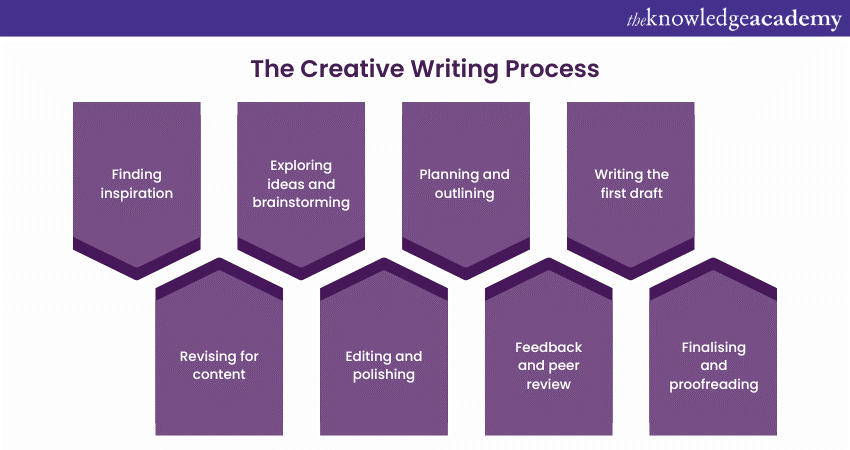
Creating a compelling piece of Creative Writing is a journey that involves a series of steps, each contributing to the evolution of your story. Whether you're crafting a short story, a novel, or a poem, here's a breakdown of the Creative Writing process in eight essential steps:
1) Finding inspiration
The process begins with a moment of inspiration—a fleeting thought, an intriguing image, or a powerful emotion. Inspiration can strike anywhere—nature, experiences, dreams, or simple observation.
Keep a journal or digital note-taking app to capture these sparks of inspiration as they occur. Explore your interests, passions, and emotions to identify themes and ideas that resonate with you.
2) Exploring ideas and brainstorming
Once you've identified an inspiring concept, delve deeper. Brainstorm ideas related to characters, settings, conflicts, and themes. Jot down all possibilities, allowing your imagination to roam freely. This stage is about generating a wealth of creative options that will serve as building blocks for your story.
3) Planning and outlining
Organise your thoughts by creating an outline. Outline your story's major plot points, character arcs, and pivotal moments. This outline acts as a roadmap, guiding you through the narrative's progression while providing flexibility for creative surprises.
4) Writing the first draft
Once you are done with your outline, start writing your first draft. Don't worry about perfection—focus on getting your ideas onto paper. Let your creativity flow and allow your characters to surprise you. The goal is to have a complete manuscript, even if it's messy and imperfect.
5) Revising for content
Once the first draft is complete, take a step back before revisiting your work. During this stage, focus on revising for content. Analyse the structure of your plot, the development of your characters, and the coherence of your themes. Make necessary changes, add details, and refine dialogue. Ensure that your story's foundation is solid before moving on.
6) Editing and polishing
Edit your Manuscript for grammar, punctuation, sentence structure, and style. Pay attention to clarity and consistency. Also, focus on enhancing the flow of your writing and creating a polished narrative that engages readers.
7) Feedback and peer review
Share your revised work with others—friends, writing groups, or beta readers—to gather feedback. Constructive criticism can highlight blind spots and offer perspectives you might have missed. Use this feedback to refine your work further.
8) Finalising and proofreading
Incorporate the feedback you've received and make final revisions. Proofread meticulously for any remaining errors. Ensure that your work is formatted correctly and adheres to any submission guidelines if you plan to publish or share it.
Tips for effective Creative Writing
Here are some of the useful tips you should consider incorporating in your process of writing :
1) Show, don't tell: Instead of directly stating emotions or details, "showing" involves using actions, thoughts, and dialogue to convey information. This technique allows readers to draw their own conclusions and become more immersed in the story.
2) Use of metaphors and similes: Metaphors and similes offer creative ways to describe complex concepts by comparing them to something familiar. These literary devices add depth and creativity to your writing.
3) Building suspense and tension: By strategically withholding information and creating unanswered questions, Writers can build suspense and keep readers eagerly turning pages.
4) Crafting memorable beginnings and endings: A strong opening captures readers' attention, while a satisfying conclusion leaves a lasting impact. These elements bookend your story and influence readers' overall impression.
5) Experimenting with point of view: The choice of point of view (first person, third person, etc.) shapes how readers experience the story. Experimenting with different perspectives can lead to unique narrative opportunities.
Conclusion
We hope this blog gave you a clear idea of What is Creative Writing, along with its process and useful tips. The Creative Writing process is not linear; you might find yourself revisiting earlier steps as your story evolves. Embrace the journey, allowing your writing to develop and transform through each phase.
Enhance your Academic Writing prowess with our comprehensive Academic Writing Masterclass . - sign up now!
Frequently Asked Questions
a) Literary Agent
b) Screenwriter
c) Video Game Story Writer
d) Copywriter
e) Website Editor
f) Creative Director
There are several resources or recommended readings which can help you to hone your Creative Writing skills. Here we have discussed some of such resources:
a) “On Writing: A Memoir of the Craft" by Stephen King
b) "Bird by Bird: Some Instructions on Writing and Life" by Anne Lamott
c) "Writing Down the Bones: Freeing the Writer Within" by Natalie Goldberg
d) Joining book clubs
e) Reading a variety of authors and genre
f) Practicing writing regular prompts and exercises.
The Knowledge Academy takes global learning to new heights, offering over 30,000 online courses across 490+ locations in 220 countries. This expansive reach ensures accessibility and convenience for learners worldwide.
Alongside our diverse Online Course Catalogue, encompassing 17 major categories, we go the extra mile by providing a plethora of free educational Online Resources like News updates, Blogs , videos, webinars, and interview questions. Tailoring learning experiences further, professionals can maximise value with customisable Course Bundles of TKA .
The Knowledge Academy’s Knowledge Pass , a prepaid voucher, adds another layer of flexibility, allowing course bookings over a 12-month period. Join us on a journey where education knows no bounds.
The Knowledge Academy offers various Personal Development courses , including Organisational skills training, Emotional Intelligence Training, and Report Writing Course. These courses cater to different skill levels, providing comprehensive insights into Journalism . Our Business Skills blogs covers a range of topics related to Sports Journalism, offering valuable resources, best practices, and industry insights. Whether you are a beginner or looking to advance your Creative Writing skills, The Knowledge Academy's diverse courses and informative blogs have you covered.
Upcoming Business Skills Resources Batches & Dates
Fri 13th Dec 2024
Fri 3rd Jan 2025
Fri 7th Mar 2025
Fri 2nd May 2025
Fri 4th Jul 2025
Fri 5th Sep 2025
Fri 7th Nov 2025
Get A Quote
WHO WILL BE FUNDING THE COURSE?
My employer
By submitting your details you agree to be contacted in order to respond to your enquiry
- Business Analysis
- Lean Six Sigma Certification
Share this course
Biggest black friday sale.

We cannot process your enquiry without contacting you, please tick to confirm your consent to us for contacting you about your enquiry.
By submitting your details you agree to be contacted in order to respond to your enquiry.
We may not have the course you’re looking for. If you enquire or give us a call on 01344203999 and speak to our training experts, we may still be able to help with your training requirements.
Or select from our popular topics
- ITIL® Certification
- Scrum Certification
- ISO 9001 Certification
- Change Management Certification
- Microsoft Azure Certification
- Microsoft Excel Courses
- Explore more courses
Press esc to close
Fill out your contact details below and our training experts will be in touch.
Fill out your contact details below
Thank you for your enquiry!
One of our training experts will be in touch shortly to go over your training requirements.
Back to Course Information
Fill out your contact details below so we can get in touch with you regarding your training requirements.
* WHO WILL BE FUNDING THE COURSE?
Preferred Contact Method
No preference
Back to course information
Fill out your training details below
Fill out your training details below so we have a better idea of what your training requirements are.
HOW MANY DELEGATES NEED TRAINING?
HOW DO YOU WANT THE COURSE DELIVERED?
Online Instructor-led
Online Self-paced
WHEN WOULD YOU LIKE TO TAKE THIS COURSE?
Next 2 - 4 months
WHAT IS YOUR REASON FOR ENQUIRING?
Looking for some information
Looking for a discount
I want to book but have questions
One of our training experts will be in touch shortly to go overy your training requirements.
Your privacy & cookies!
Like many websites we use cookies. We care about your data and experience, so to give you the best possible experience using our site, we store a very limited amount of your data. Continuing to use this site or clicking “Accept & close” means that you agree to our use of cookies. Learn more about our privacy policy and cookie policy cookie policy .
We use cookies that are essential for our site to work. Please visit our cookie policy for more information. To accept all cookies click 'Accept & close'.

IMAGES
VIDEO